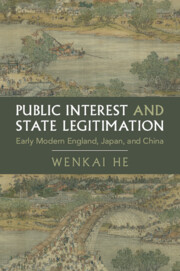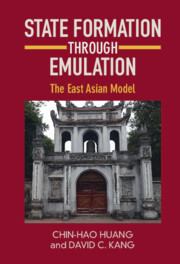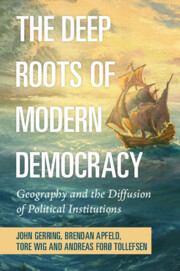Public Interest and State Legitimation
Early Modern England, Japan, and China
Part of Cambridge Studies in Historical Sociology
- Author: Wenkai He, Hong Kong University of Science and Technology
- Date Published: October 2023
- availability: Not yet published - available from October 2024
- format: Paperback
- isbn: 9781009334556
Paperback
Other available formats:
Hardback, eBook
Looking for an inspection copy?
This title is not currently available for inspection. However, if you are interested in the title for your course we can consider offering an inspection copy. To register your interest please contact [email protected] providing details of the course you are teaching.
-
How were state formation and early modern politics shaped by the state's proclaimed obligation to domestic welfare? Drawing on a wide range of historical scholarship and primary sources, this book demonstrates that a public interest-based discourse of state legitimation was common to early modern England, Japan, and China. This normative platform served as a shared basis on which state and society could negotiate and collaborate over how to attain good governance through providing public goods such as famine relief and infrastructural facilities. The terms of state legitimacy opened a limited yet significant political space for the ruled. Through petitioning and protests, subordinates could demand that the state fulfil its publicly proclaimed duty and redress welfare grievances. Conflicts among diverse dimensions of public interest mobilized cross-regional and cross-sectoral collective petitions; justified by the same norms of state legitimacy, these petitions called for fundamental political reforms and transformed the nature of politics.
Read more- Deeply engages with English, Japanese, and Chinese scholarships in political and social history to examines state formation, bringing multiple historical scholarships of Western Europe and East Asia into dialogue with each other
- Integrates theories of state legitimacy with historical research on early modern welfare policies and petitioning to provide a new perspective that emphasizes the domestic dimension of state formation and the space for political participation in authoritarian early modern states
- Outlines the importance of collaboration between early modern state and society in domestic governance and develops new explanations of state capacity and the expansion of political participation
Reviews & endorsements
'In this deeply researched work, Wenkai He makes a major contribution to our understanding of state formation. Breaking new ground with a sweeping comparison of early modern England, Japan, and China, he shows how central the provision of public goods was to the process whereby states secured legitimacy, as well as to pre-democratic forms of political participation. This book will be of interest to scholars of contemporary state-society relations, as well as everyone interested in state formation.' Peter A. Hall, Krupp Foundation Professor of European Studies, Harvard University
See more reviews'Sometimes the story of the state begins with welfare and legitimation, not warfare and taxation. Wenkai He's masterful and creative comparative-historical analysis of early modern China, England, and Japan demonstrates that fruitful state-society collaborations originated with the state's professed duty to provide public goods rather than contractual exchanges of taxes for individual rights.' Dan Slater, James Orin Murfin Professor of Political Science, and Director, Weiser Center for Emerging Democracies (WCED), University of Michigan
'This elegantly written book explores a neglected aspect of state building before the advent of mass democracy: how states and their subjects negotiate and co-operate in the provision of public goods, thus expanding the state's reach and imprint. Rather than through war or the guaranteeing of property rights to maximize tax revenues, Wenkai He shows that the state in early modern England, Tokugawa Japan, and Qing China enlarged its power and legitimacy by safeguarding the public interest of society.' Andreas Wimmer, Lieber Professor of Sociology and Political Philosophy, Columbia University
'This is an important book. Recent comparisons of state building have focused on its most easily measured dimensions: taxation, the mobilization of armies, and, to a much lesser extent, the provision of infrastructure and other important services. Wenkai picks up where this literature leaves off, asking important questions about ideology and state legitimation, and moving our discussion of political participation and representation beyond a simple yes/no binary to a much more nuanced exploration of how the interactions of local elites and their governments changed over the course of the early modern period in England, Japan, and China. His impressive combination of large-scale synthesis and original primary source research should appeal to scholars and students across the social sciences and humanities; one hopes it will be widely imitated.' Kenneth Pomeranz, University Professor of Modern Chinese History and the College, University of Chicago
'Wenkai He draws on his wide reading in Chinese, Japanese, and English historical literatures to engage with social science debates about early modern state formation, as both a common and a pluriform process. Redirecting attention from war and coercion to infrastructural and welfare provision, he looks set to ignite exciting interdisciplinary conversations.' Joanna Innes, Emeritus Professor of Modern History, Oxford University, and Senior Research Fellow, Somerville College
Customer reviews
Not yet reviewed
Be the first to review
Review was not posted due to profanity
×Product details
- Date Published: October 2023
- format: Paperback
- isbn: 9781009334556
- length: 320 pages
- dimensions: 228 x 152 x 17 mm
- weight: 0.47kg
- availability: Not yet published - available from October 2024
Table of Contents
Introduction
Part I:
1. Legitimacy and resilience of the early modern state
2. State-society collaboration against subsistence crisis
3. Financing public infrastructure
4. The negotiation of state and society over redress of grievances
Part II. Prologue: Limits to Early Modern State Resilience:
5. A political 'great divergence': England (1640–1780), Japan (1853–1895) and China (1840–1911)
Conclusion: toward a contextualized comparative historical analysis.
Sorry, this resource is locked
Please register or sign in to request access. If you are having problems accessing these resources please email [email protected]
Register Sign in» Proceed
You are now leaving the Cambridge University Press website. Your eBook purchase and download will be completed by our partner www.ebooks.com. Please see the permission section of the www.ebooks.com catalogue page for details of the print & copy limits on our eBooks.
Continue ×Are you sure you want to delete your account?
This cannot be undone.
Thank you for your feedback which will help us improve our service.
If you requested a response, we will make sure to get back to you shortly.
×






